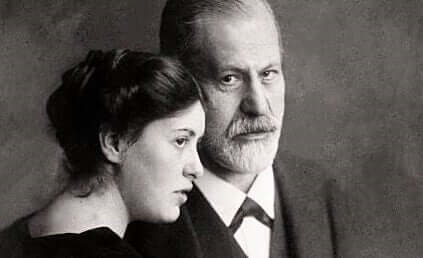When Sigmund Freud lost his daughter Sophie, he was forced to change many of his theories about bereavement, he was fully aware that this pain and emptiness would never go away, they may weaken over time, but never disappear. there were no safe havens to go to and be able to alleviate suffering, because the death of a child was, in his opinion, inconceivable.
Sophie Freud was the fifth daughter of Sigmund Freud and Sophie Halberstad, born on April 12, 1893 and almost immediately became her father’s favorite, this girl, almost unaware why, has calmed the tyrannical and patriarchal character of the father of psychoanalysis. She was beautiful, resolute and always determined to follow her own will, beyond what determined the environment.
- At the age of 20 he married Max Halberstadt.
- A photographer and retratist from Hamburg.
- This 30-year-old boy was not rich.
- Either very special or with a good projection.
- So Sigmund Freud knew that his daughter might one day be However.
- He did not oppose romance and made him promise his daughter that he would keep him informed of his problems and concerns.
Young Sophie did. No one could have predicted that Freud’s favorite happiness would not last long and that only six years after marriage, he would eventually die.
“I work as hard as I can and I’m grateful for what I have. But the loss of a child appears to be a serious injury. The so-called duel will probably last a long time. – Freud’s letter to Ludwig Binswanger-“
A year after Sophie and Max Halberstadt were married Ernst Wolfgang, Sigmund Freud himself was fascinated by the little one and did not hesitate to write about this birth to his colleague Karl Abraham:
“My grandson Ernst is a lovely little boy who laughs badly when someone is paying attention. Is it a precious creature in these times when only unscathed bestiality grows?
Remember that World War I unfolded around Europe, Sigmund Freud was one of the first figures to warn against this bewildering and brutal thought that germinates even in his hometown, Vienna, however, his personal and family environment was not affected until Hitler’s arrival. power in 1933.
Until then, Freud continued to develop his work while continuing to exchange letters with his daughter Sophie. On December 8, 1918, her second grandchild, Heinz, was born that the young woman told her father that she was in financial trouble. and that the arrival of this second son was a blessing?but also a problem.
Freud did not hesitate to offer them the help they needed, yet, as can be read in Sigmund Freud’s Letters, he also offered his daughter advice on the contraceptive methods of the time, however, they did not seem effective because a year later, Sophie was pregnant again.
When Sophie wrote to her father fearingly announcing her third unwanted pregnancy, her father responded as follows:
If you think the news makes me angry or horrifies, you are wrong. Accept this baby, make no mistake. In a few days the payment of some of my new editions will arrive.
However, in 1920, Europe was a victim of Spanish influenza and Sophie, greatly weakened by her third pregnancy, finally became infected in January of the same year. He died a few days after an infection. When Sigmund Freud lost his daughter Sophie, he wrote about the impact of this experience.
He explained, for example, that he could not find a means of transport with his daughter in his last days, all he could do was go to his funeral and assume a loss for which he could find no meaning or explanation. Nine years after that loss, another attention-caught incident occurred. In a letter he wrote to one of his best friends and colleagues, Ludwig Binswanger, he says he has yet to overcome the loss.
“We know that the acute pain we feel after a defeat continues, but we also remain inconsolable and never find a replacement. Whatever happens, no matter what we do, the pain will always be there. And so it must be. It’s the only way to perpetuate a love we don’t want to give up. – Sigmund Freud’s letter to Ludwig Binswanger-
In Sigmund Freud’s Letters, we can even read the letters Freud and Dr. Arthur Lippmann of the Hamburg hospital sent after Sophie’s death at age 26. In this document, the father of psychoanalysis regrets that the medicine has not been able to have effective contraception. Moreover, in these letters, he even regrets what he called “a stupid and inhuman law that forced women to pursue unwanted pregnancies. “
When Sigmund Freud lost his daughter Sophie, he tried to deal with pain in his own way and made it last more than 10 years, to the point of having to reformulate this concept in his theories.
He had to assume that, in the face of loss, it was possible to experience both sadness and melancholy, and that both states were acceptable, even pain itself was a challenge consistent with survival, was, and remains, this stubborn bond. that the person refuses to give up, because it is the only way to continue to feel the love of a loved one.

